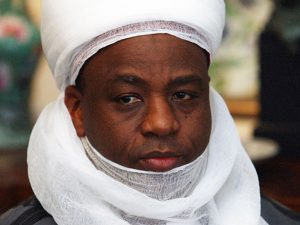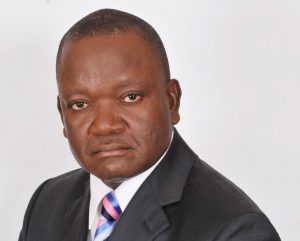
The Sultan of Sokoto

Abubakar Dangiwa Umar (rtd)

Gov Samuel Ortom of Benue State
Looking at it from his observatory in Kaduna, Col. Abubakar Dangiwa Umar, (rtd) could not help raise the first alarm: N38b for a cargo airport? Where in the world are farm produce of the types in Benue transported by air? Then the Sultan of Sokoto came in to question how (cargo) airports became more primary than roads. What about the common man whose own greater needs is for good roads? It had taken the Benue State Government’s N38b cargo airport approach to agricultural transformation to trigger an alarm on agriculture and the Northern Question in Nigeria. That question has been defined differently but central to it is the puzzle as to why Nigeria’s Garden of Eden as far as agricultural endowment is concerned might be so desolate or as grim as the north is today. The two views in the alarm suggest a regional disapproval for both an approach to governance and to agriculture in any part of the region at a time when agriculture is no more a quaint concept in the struggle to surmount violent conflicts, fissures and fragmentation through development. The regional unease is even more understandable when the north looks far afield.
Oil could be there under the ground somewhere in the Chad or Benue or Niger area within the northern landscape. Oil has got plenty of money in it but it can only be cornered by a few who can afford the level of technology, the big capital, costly and elaborate outlay involved such as a lot of money at the retail end to buy tankers and build petrol stations, to pay for insurance that would protect against peculiar risks and so on. It would bring up the region as also an oil producing section of the country, but by its very nature, it would not create prosperity downstairs, would not employ millions and it can only produce growth without development. Very importantly, the global market has been compounded by the emergence of all two contemporary great powers as oil exporters. Add to that the emergence of alternative sources of energy vis-a-vis the climate change and environment crisis as well as the rise of new ways to wealth: agriculture, solid minerals, tourism and entertainment. Of course, more powerful oil corporations would end up thinking for the region too, not only in terms of how much oil to pump in or pump out as far as profit maximisation is concerned but also in terms of long term accumulation. This might not be a big problem only in Africa where the elite do not care who thinks for them or do not want the difficult job of thinking for the country.

Sir, Ahmadu Bello, the late Sardauna of Sokoto

Another view of Mambilla Plateau

River Sokoto

Oranges Sold on the roadside in Benue
In this context, a highly agriculturally endowed region as northern Nigeria must be sensitive to the governance – agriculture nexus. This is more so that its experience of stasis of that sector in the region is, in the view of many credible observers, squarely a problem of quality of leadership. In fact, a particular view is that the leaders were completely unaware of what agriculture ought to have meant until a dangerous reality has tasked them to it. And the source of this argument would go on to say that since the 1966 coup, the emphasis on agriculture for which the north had advantage has not been maintained. The successor generation after the First Republic collapsed did not pursue agricultural policy in any sustained or consistent manner. His argument is that the creation of states aggravated matters because it made policy harmonisation difficult if not impossible. To make matters worse, most of the members of the successor generation became used to petrodollars such that reflecting on the advantages conferred by agriculture no longer took place. All these tendencies combined to undermine agricultural activities, making it less privileged and to lose priority attention. “People never thought of a time when the idea that oil is a volatile product and volatile market will translate to the situation we are in today”, it was pointed out.
With such attitude, a hostility to agriculture took many forms in the north.
One such hostility was that of the Kaduna State House of Assembly to the PRP Government ran by Balarabe Musa from 1979 to 1981. In series of publications edited and published in the office of Bala Usman who was the Secretary to the government, it was strongly suggested that the conflict between the state legislature and the governor was ideological. Balarabe Musa was understood to be egging on a socialist revolution. The connection was a simple one: Balarabe Musa was determined to establish agro-based industries. If you establish industries, you would produce workers. If you produce workers, they would acquire socialist orientations and a huge working class population would eventually produce a socialist revolution. So, stop Balarabe and stop the revolution. There was a particular legislator that was very good in making the linkages on the radio in those days.
But the agricultural framework of the Balarabe Musa regime had so much region wide potentials in agricultural transformation, through a form of domino effect. Whatever strategy documents state government in the region are working with, they have not been popularised as the Balarabe Government did. It is, therefore, difficult to determine the existence of such studied positions on agriculture that speak to the challenge of systematic poverty reduction, not to talk of poverty eradication. Jigawa State came closest to something like that in 2007 before it decided to favour what might be called an Infrastructure strategy of development. The totally and embarrassingly bare nature of the place at that time perhaps makes that an understandable decision, particularly that there was a debate on strategy at least. It is possible many of the governors today have equally held debates and the cargo airports sprouting all over the place in the region might be the products of some debate. In that sense, it is not whether there have been any debates but rather about how critical the debates might have been with regards to whether they can fire any serious transformative strides.
But, between 1983 and 1993, the north took actions that further undermined the legacy of the Sardauna of Sokoto and late Premier of the region, not only in agriculture but also in the media industry, the educational arena, core industry and regional conglomerates he put together. Those were the years northern governors approved the sale of Kaduna Textiles and other textile companies in the Kakuri Industrial Estate the Sardauna established in the early 1960s. Ever since then, the trend has continued. So, the 1966 coup has continued but this time, by the northerners each time they lowered the threshold regarding one such institution or the other, be it KTL or NNDC or BON or Kaduna Polytechnic or ABU, Zaria or the New Nigerian down to the arena of agriculture.
When you narrow this list to agriculture, no part of the north is an exception. In Benue area, the advantages are theirs in terms of yams and oranges. But neither the Yam Powder nor the Yam Pounder is coming out of the area. And beyond the travellers, bulks of the oranges have no guarantee of any more stable markets. So, after decades of specialisation, there is still no connection between what is produced, the producers and the possible outcomes. In other words, there is no such thing as being able to process anything that is produced. Neither the state government nor the businessmen, retired Generals and politicians could hear, see or feel anything about products that rot away after some days.
When the traveller turns to the eastern part of the region, he meets many things, agriculturally. Mambilla Plateau in Taraba State is one of such resources. It is capable of multiple utility, from tea to milk to energy to food. In the case of Mambilla, the Federal Government of Nigeria is there but the incoherence of the Nigerian State is such that it has been a mission impossible. This is not to talk of the Lake Chad yet.
From Taraba, there is Sokoto where there are two rivers, all hungry and willing to be exploited. There is River Sokoto which flows from Funtua through Katsina, through Kebbi and Zamfara before continuing its journey to Niger Republic. Then there is River Rima which flows from Niger Republic, leaving a big, wet valley for all year round farming. There are two big dams here, a voice intoned. There is Bakalori Dam and there is Goronyo Dam. We are not exploiting them here to maximum utility. The voice is referring to the energy potentials in exploiting the dams and valleys to the full.
Instead of processing facilities, the type any observant traveller notices from the air upon departing Charles De Gaulle Airport Africa wards, it is endless and uncritical stories of groundnut pyramids in Kano in those days. But groundnut pyramids in Kano wasn’t a glorious story because it involved peasants being made to grow the stuff as high as the pyramids but for a purpose. That purpose was for the product to be taken out of Nigeria to provide livestock feed for cattle while the local cattles here barely ate anything nourishing to our own beef eaters. Instead and in addition to a poor feeding regime, the cattles trek hundreds of kilometres to the southern parts of the country. Only within the last few months has anything been done to change this tradition of subjecting our own livestock to terrible conditions in the long, torturous movement from the north to the south. But even then, this initiative of moving cattle by rail is a hotchpotch capitalism rather a regional strategy aimed at streamlining agriculture as a collective survival strategy.
The dynamics of regional competition for power might have compelled the northern elite to assert the region’s agricultural advantage and how the north feeds the rest of the country in relating with oil brandishing south. But the risk in doing that without moving from agricultural production to agricultural processing is to merely draw in to the advantages of modern agriculture which can call technology to the help of growing whatever products almost anywhere. Without strength in industries and with power having become diversified, how might a vast and diverse region such as northern Nigeria do without agricultural transformation?
The uproar that has greeted the Benue State Government’s adventure is something new and bound to interest the governor except if Governor Ortom were to say, but I have magically secured a Benue share of the West African market or that of the EU market for Benue yams, oranges and cassava. Certainly and in the absence of intra-African rails network and in view of the unsuitability of the water ways in this regard, there is some sense in talking about cargo airport. Whether that can be by a government in prolonged indebtedness to workers is a different matter. Or whether the cost implication should be up to the sum involved. And, why can the products not be processed in Benue State and exported? Why strengthen export of raw materials and import of finished goods in another way?
So, the verbal disapproval so far suggests some kind of monitoring of power and leadership, with particular reference to agriculture in northern Nigeria. In March 2008, it was even more blunt from General T. Y. Danjuma who not only rated governors in the north the worst set in Nigeria but equally defined them as people the Arewa and the Middle Belt Forum should control. How great would it be if the emerging tradition would be expanded in scope! The ultimate would have been to achieve a northern consensus in favour of the developmental state in Nigeria. Nigeria is slowly but steadily heading there but it might still take a jolt before that happens. Aliko Dangote’s rebellion a week ago asking the Federal Government to reverse the privatisation in the power sector must have come to many as a shock. Whatever motif might have impelled him, there is a powerful nugget of truth in his intervention. That truth is the risk in unregulated capitalism for a developing country. That is substantially what has brought the north down on its knees. That is also what happened to the Asians in 1998.
The current situation whereby a governor or a minister obviously thinks that it is an achievement to concession a major road network will bring this country down in no time. Recent nasty experiences in the north makes the region the foremost persuader of Nigeria against risky development strategy options. The way such experiences affected everyone throughout the country compels everyone to listen to the north. Deregulate the economy quite alright but do not hinder the state from being an investor. It is only after the next ten years of that under an informed leadership that Nigeria may look at the details and then decide where to turn next in this matter.
Whichever option is decided, it should be borne in mind that it is not open to a society in decay to choose the form of that decay. If such option were available, the Roman Empire would never have ended the way it did. In the last six years, this region has seen many things which are not normal sights. Reflections on that should inform managing agriculture in such a way that it could actually be the peace keeper in northern Nigeria and, by implication, Nigeria too, depending on how it is worked out. The complexity of pluralism in the north leaves us with few viable alternatives.



























